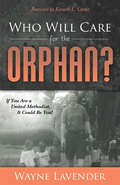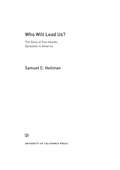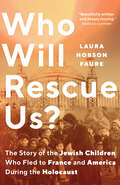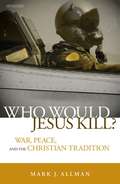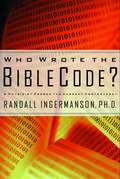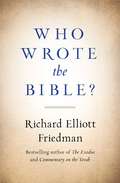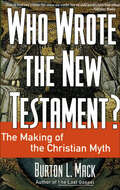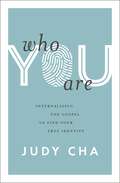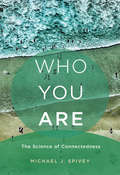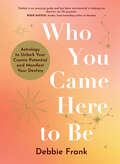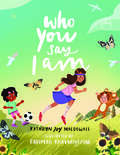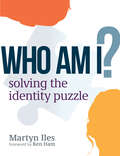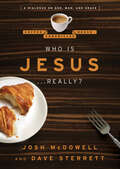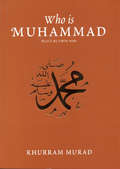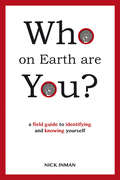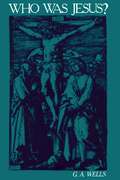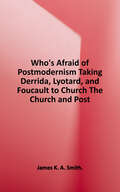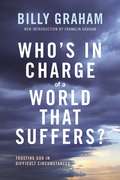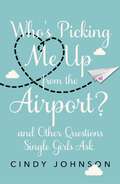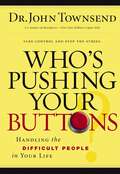- Table View
- List View
Who Will Care for the Orphan?: If You Are A United Methodist, It Could Be You! (Morgan James Faith)
by Wayne LavenderThis book is an important contribution for all United Methodists concerned that their denomination is approaching irrelevance. Within its pages Dr. Lavender offers a Biblical, Wesleyan and means-tested approach that both saves the lives of millions of orphans and vulnerable children and inspires evangelical hope for the church.
Who Will Lead Us?: The Story of Five Hasidic Dynasties in America
by Samuel C. HeilmanHasidism, a movement many believed had passed its golden age, has had an extraordinary revival since it was nearly decimated in the Holocaust and repressed in the Soviet Union. Hasidic communities, now settled primarily in North America and Israel, have reversed the losses they suffered and are growing exponentially. With powerful attachments to the past, mysticism, community, tradition, and charismatic leadership, Hasidism seems the opposite of contemporary Western culture, yet it has thrived in the democratic countries and culture of the West. How? Who Will Lead Us? finds the answers to this question in the fascinating story of five contemporary Hasidic dynasties and their handling of the delicate issue of leadership and succession. Revolving around the central figure of the rebbe, the book explores two dynasties with too few successors, two with too many successors, and one that believes their last rebbe continues to lead them even after his death. Samuel C. Heilman, recognized as a foremost expert on modern Jewish Orthodoxy, here provides outsiders with the essential guide to continuity in the Hasidic world.
Who Will Rescue Us?: The Story of the Jewish Children who Fled to France and America During the Holocaust
by Laura Hobson FaureThe first account of Jewish children&’s flight from Nazi Germany to France—and their subsequent escape to America from the Vichy regime At the eve of the Second World War, an estimated 1.6 million Jewish children lived in Nazi-occupied Europe. While 10,000 of them escaped to Britain in the Kindertransport, only some 500 found a new home in France. Here they attempted to begin again—but their refuge would all too soon become a trap. For the first time, Laura Hobson Faure brings to life the experiences of these children, and the Jewish and non-Jewish organizations who helped them. Drawing on survivors&’ testimonies as well as children&’s diaries, letters, drawings, songs, and poems, Who Will Rescue Us? re-creates their complex journeys, including how some of them eventually found safety in America. Hobson Faure paints a moving portrait of these children and their escape, uncovering their agency in the flight from Nazism—and knits together the network of the many who aided them along the way.
Who Would Jesus Kill?: War, Peace, And The Christian Tradition
by Mark J. AllmanA concise, provocative look at the continuum of approaches to war and peace within the Christian tradition and beyond: pacifism, holy war and just war. In Who Would Jesus Kill? War, Peace, and the Christian Tradition, Dr. Mark J. Allman asks a provocative, timely, and timeless question. Readable and thought-provoking, Who Would Jesus Kill? Provides an overview of approaches to war and peace within the Christian tradition. The author invites students to reflect on their own views as he examines in detail the topics of holy war, just war, and pacifism. An appendix further explores the issues of war and peace from Jewish and Muslim perspectives.
Who Would Like a Christmas Tree?
by Ellen Bryan ObedWho would like a Christmas tree? That all depends on when you ask. In January, in February, in March, in April . . . the black-capped chickadees, the field mice, the white-tailed deer, and the woodcock, come to claim the tree. They want it for breakfast, lunch, and dinner, for shelter and protection, for a place to start a new family. Can a Christmas tree be all that? Yes, and even more . . . The year has just begun!
Who Wrote The Bible
by Richard Elliott Friedman"Richard Elliott Friedman focuses on the central books of the Old Testament--Genesis, Exodus, Leviticus, Numbers, and Deuteronomy--and makes a persuasive argument for the identities of their four different authors. Drawing upon the most recent archeological discoveries, Friedman presents a vivid picture of the world of the Bible as he examines where and when these writers lived, the politics and history embedded in their stories, and their relationship to the events they describe and to one another. Challenging many conventional theories of biblical scholarship, he also sheds light on the marvel of the Bible's synthesis, on how the various documents were brought together to form a single text. Who Wrote the Bible? enriches our understanding of the Bible as literature, as history, and as sacred text, and is indispensable for anyone who loves and reads the Good Book."
Who Wrote the Bible Code?: A Physicist Probes the Current Controversy
by Randall IngermansonWhat is the truth about the Bible code? How can you decide what to believe? Why does it matter? Around the world, men and women are captivated by a theory so incredible that, if proven true, it would forever revolutionize mankind's view of Scripture. Some experts have claimed the Bible contains a code that accurately predicts today's events. Others renounce the Bible code theory as unfounded.Using a new statistical test that promises to provide an authoritative, credible answer to the Bible code debate, computational physicist Dr. Randall Ingermanson leads you on an easily understandable, meticulously planned investigation of the evidence at hand-addressing the most urgent questions surrounding the Bible code controversy and carefully examining how recent findings could affect your faith.From the Trade Paperback edition.
Who Wrote the Bible?
by Richard FriedmanA much anticipated reissue of Who Wrote the Bible?—the contemporary classic the New York Times Book Review called “a thought-provoking [and] perceptive guide” that identifies the individual writers of the Pentateuch and explains what they can teach us about the origins of the Bible.For thousands of years, the prophet Moses was regarded as the sole author of the first five books of the Bible, known as the Pentateuch. According to tradition, Moses was divinely directed to write down foundational events in the history of the world: the creation of humans, the worldwide flood, the laws as they were handed down at Mt. Sinai, and the cycle of Israel’s enslavement and liberation from Egypt. However, these stories—and their frequent discrepancies—provoke questions: why does the first chapter in Genesis say that man and woman were made in God’s image, while the second says that woman was made from man’s rib? Why does one account of the flood say it lasted forty days, while another records no less than one hundred? And why do some stories reflect the history of southern Judah, while others seem sourced from northern Israel? Originally published in 1987, Richard Friedman’s Who Wrote the Bible? joins a host of modern scholars who show that the Pentateuch was written by at least four distinct voices—separated by borders, political alliances, and particular moments in history—then connected by brilliant editors. Rather than cast doubt onto the legitimacy of the Bible, Friedman uses these divergent accounts to illuminate a text that was written by real people. Friedman’s seminal and bestselling text is a comprehensive and authoritative answer to the question: just who exactly wrote the Bible?
Who Wrote the New Testament?: The Making of the Christian Myth
by Burton L. Mack“One of those rare volumes that . . . makes one wonder how we could possibly have lived without it. . . . [A] must-read for any student of the New Testament.” —Publishers WeeklyIn this groundbreaking and controversial book, Burton Mack brilliantly exposes how the Gospels are fictional mythologies created by different communities for various purposes and are only distantly related to the actual historical Jesus.Mack‘s innovative scholarship which boldly challenges traditional Christian understanding will change the way you approach the New Testament and think about how Christianity arose.“A powerful, compact, yet detailed introduction to the New Testament and the origins of Christianity. Mack has sketched the panorama of early Christian literature and social development in a lucid, convincing, and magisterial performance.”— Robert W. Funk, founder of the Jesus Seminar and author of The Five Gospels“Certainly Mack's book should take a place in the front ranks [of New Testament introductions].” —Booklist “Finally! Someone has penetrated the theological agenda that has informed a century of New Testament scholarship to provide a thoroughgoing historical overview of Christian origins.” Luther H. Martin, author of Hellenistic Religions
Who You Are: Internalizing the Gospel to Find Your True Identity
by Judy ChaIn our culture today, the preoccupation over self-identity--or who we are--is hard to ignore. But the pursuit of self-understanding has been a recurring theme throughout human history. How many times have you asked yourself, "Who am I?"The desire to answer this question--whether it manifests in self-enhancement strategies or self-serving biases--is part of being human. Yet, through a Biblical lens, we know something has gone terribly wrong with our human nature. Brokenness happened when sin separated us from our Creator God, and the answers we seek are only obtainable when we reconnect with him.Using the Gospel-Centered Integrative Framework for Therapy developed at Redeemer Counseling Services, Judy Cha explains:The human desire for an identityThe role of shame and hurt in shaping who we think we areSelf-redemption, and why it doesn't workThe Gospel as God's rescue plan for a lost humanityHow to ardently know your story, truly live in your community, and deeply connect with GodWho You Are shows us that the Gospel is the only thing that sets you free from the verdict of sin and justifies you as God's prized possession. When you internalize the Gospel--this message of restorative love--you come to know who you are more and more every day.This unique resource is ideal for those who feel stuck in a perpetual loop of "finding themselves" and for counselors or ministry leaders seeking to help others with gospel-centered healing.
Who You Are: The Science of Connectedness (The\mit Press Ser.)
by Michael J. SpiveyWhy you are more than just a brain, more than just a brain-and-body, and more than all your assumptions about who you are.Who are you? Are you just a brain? A brain and a body? All the things you have done and the friends you have made? Many of us assume that who we really are is something deep inside us, an inner sanctuary that contains our true selves. In Who You Are, Michael Spivey argues that the opposite is true: that you are more than a brain, more than a brain-and-body, and more than all your assumptions about who you are. Rather than peeling layers away to reveal the inner you, Spivey traces who you are outward. You may already feel in your heart that something outside your body is actually part of you—a child, a place, a favorite book. Spivey confirms this intuition with scientific findings.With each chapter, Spivey incrementally expands a common definition of the self. After (gently) helping you to discard your assumptions about who you are, he draws on research in cognitive science and neuroscience to explain the back-and-forth among all the regions of the brain and the interaction between the brain and body. He then makes the case for understanding objects and locations in your environment as additional parts of who we are. Going even further, he shows that, just as interaction links brain, body, and environment, ever-expanding systems of interaction link humans to other humans, to nonhuman animals, and to nonliving matter. This may seem an interaction or two too far. But you don't have to take his word for it—just consider the evidence he presents.
Who You Came Here to Be: Astrology to Unlock Your Cosmic Potential and Manifest Your Destiny
by Debbie FrankLearn how to decode your birth chart and reveal your soul&’s mission for incredible personal growth.Astrology is the ultimate power tool for self-development, empowerment, and healing. Its magic flows through every aspect of our lives—from our work and relationships to our inner power and creative inspiration—leaving signposts, messages, and guidance to assist us on our soul journey. This book reveals how to join the dots between the messages and unlock your true cosmic potential.Drawing on her decades of experience, world-renowned Master Astrologer Debbie Frank will show you:· Why your soul is here at this moment and what your life purpose is.· How to interpret the positions and deep soul intentions of the planets and aspects in your birth chart.· The connection between the cosmos and your life through your angles.· How the nodes can reveal your soul path and soul connections with others.With these new insights into your birth chart and soul gifts, you'll discover how to find your true purpose, raise your vibration, and transform your life.[This book was first published as 9781401962296 What&’s Your Soul Sign?]
Who You Say I Am
by Kathryn Joy MacDowallInspired by the Hillsong Worship song &“Who You Say I Am,&” this beautiful picture book honors each child&’s unique qualities while reminding us that our identity in God is always the most important part of who we are. &“I am who You say I am!&” we can shout. I know who I am without a doubt. God made each one of us with different personalities, fun preferences, and unique gifts. But the thing that is most important about us is always the same: His love for us! In Who You Say I Am, vibrant illustrations take readers ages 3-8 from school to the zoo, from ballet class to the beach, as hand-lettered rhymes and Bible verses explore the truth that we are chosen, forgiven, and God&’s beloved workmanship.
Who am I?
by Lena Nelson DooleyLeiann is shocked to learn, at the reading of her mother's will, that her mother's husband was not Leiann's biological father. Although Leiann inherits all of her mother's possessions, she must go and meet her grandfather, who owns the house. She does this, and things are not what they seem.
Who am I?: Solving the Identity Puzzle
by Martyn IlesWho am I? This question holds great significance, and the answer is defining a generation and impacting eternity. Martyn Iles, the Executive CEO of Answers in Genesis, masterfully equips this generation with truth and hope providing a compelling biblical apologetic on this issue of identity in his book, Who Am I? The freedom to create or choose your own identity is being normalized by our culture. This self-created worldview leads to self-worship. According to Iles, this age of identity “is immunizing a generation against a sense of their sinfulness and desperate need before God. It is telling them to take that for which Christ had to die — their “true selves” — and to embrace it, live by it, and be proud of it. This is a message that ensures people will never get over the threshold of God’s kingdom because they will never be poor in spirit. It is condemning a generation to hell.” Pg 32 “As you read this book, you’ll dive deep into Genesis and God’s design for mankind. Martyn pulls out eternal truths that the church has long taught and known and applies them anew for a lost and confused generation. And he does so in a way that points to Christ and His completed work for us on the Cross.” Ken Ham, Founding CEO of Answers in Genesis Read Who Am I? to anchor yourself and your family in the gospel. While the world chooses to indoctrinate even the youngest students to dismiss God’s law, this graphically engaging and easy to read, Christian resource will arm you with the pure wisdom of the incorruptible Word of God. Use Who Am I? in family devotions, Bible study groups, and evangelical events allowing the double-edged sword of the Bible to penetrate and remove the veil of deception covering our culture.
Who is Jesus . . . Really?: A Dialogue on God, Man, and Grace (The Coffee House Chronicles)
by Dave Sterrett Josh McDowellWith over 40 million books sold, bestselling author Josh McDowell is no stranger to creatively presenting biblical truth. Now, partnering with fellow apologist Dave Sterrett, Josh introduces a new series targeted at the intersection of story and truth. The Coffee House Chronicles are short, easily devoured novellas aimed at answering prevalent spiritual questions. Each book in the series tackles a long-contested question of the faith, and then answer these questions with truth through relationships and dialogue in each story.In Who is Jesus, Really?: A Dialogue on God, Man, and Grace, the group of students now meeting at the coffee house at a college town in Texas come face-to-face with the implications of the person and works of Jesus Christ. Their questions and conversations lead them to creatively respond to a well-known Atheist about Jesus&’ claims and actions. The other two books in the series: Is the Bible True, Really? and Did the Resurrection Happen, Really? continue the unfolding story at the college campus and the coffee house down the road.
Who is Jesus . . . Really?: A Dialogue on God, Man, and Grace (The Coffee House Chronicles)
by Dave Sterrett Josh McDowellWith over 40 million books sold, bestselling author Josh McDowell is no stranger to creatively presenting biblical truth. Now, partnering with fellow apologist Dave Sterrett, Josh introduces a new series targeted at the intersection of story and truth. The Coffee House Chronicles are short, easily devoured novellas aimed at answering prevalent spiritual questions. Each book in the series tackles a long-contested question of the faith, and then answer these questions with truth through relationships and dialogue in each story.In Who is Jesus, Really?: A Dialogue on God, Man, and Grace, the group of students now meeting at the coffee house at a college town in Texas come face-to-face with the implications of the person and works of Jesus Christ. Their questions and conversations lead them to creatively respond to a well-known Atheist about Jesus&’ claims and actions. The other two books in the series: Is the Bible True, Really? and Did the Resurrection Happen, Really? continue the unfolding story at the college campus and the coffee house down the road.
Who is Muhammad?
by Khurram MuradThis concise biography provides an inspiring introduction to the exemplary personality of the Prophet of Islam. This was the last book written by the late Khurram Murad as a final part of a trio on the Holy Qur'an, and the life and message of the Prophet Muhammad (pbuh).
Who on Earth Are You?
by Nick InmanWhen Nick Inman's bank asked him to identify himself he realized he had an interesting problem. Who was he really? How did he know who he was? And how on earth could he prove it beyond doubt that the person inside his head was the same as the person outside, as detailed on his documentation?Moving like a detective story, this book pieces together the formula or recipe for a complete human being, listing ingredients from the prosaic to the surprising.Self-knowledge - even merely posing questions about our true nature - is an essential part of personal growth; but its more important than that. All knowledge depends on it: how can we know anything if we don't know who is asking the questions and giving sense to reality? Can we be truly virtuous and empathetic if we don't know where these feelings stem from?En route to its destination, the book addresses some intriguing conundrums. Can science offer a complete description of an individual; without accepting the existence of mind, consciousness and spirit? Are we in danger of losing ourselves as we are taken over by our virtual identities? How does suffering shape us and equip us to help others to heal? Is technology (biometrics) the best way to decide between friend and foe? And what will be the future for the human soul when we allow machines to become "people" too?
Who was Jesus?
by George Albert WellsWhat do we know about the historical origins of Christianity? How reliable are the 27 books of the New testament? Is Jesus a historical or a legendary figure?In the last 150 years, scholars have established many facts about the New testament, facts still largely unknown to the general public or to most church members. They have shown that the letters of Paul are earlier than the gospels and that many of the gospel stories about Jesus were unknown to Paul, that the earliest New Testament gospel is Mark and that the other gospels draw upon Mark and a now-lost gospel scholars call "Q", that none of the gospels is the work of an eye-witness, and that all the gospel writers were out of touch with events in Palestine.In Who Was Jesus?, G.A. Wells presents a survey of critical scholarly findings on the New Testament, in each case explaining the reasons for the scholars' conclusions, and describing those issues where scholars still disagree. By lucidly recounting the principles on which New testament criticism is based, this book enables readers to make up their own minds, while gently pointing to Wells' radical conclusion that the totality of the evidence supports the hypothesis of an entirely legendary Jesus. In the author's opinion, the analyses of most critics have been inhibited by their theological preconceptions, so that they have failed to draw the disturbing conclusions warranted by their findings.
Who's Afraid of Postmodernism?: Taking Derrida, Lyotard, and Foucault to Church (The Church and Postmodern Culture)
by James K. A. SmithThe philosophies of French thinkers Derrida, Lyotard, and Foucault form the basis for postmodern thought and are seemingly at odds with the Christian faith. However, James K. A. Smith claims that their ideas have been misinterpreted and actually have a deep affinity with central Christian claims. Each chapter opens with an illustration from a recent movie and concludes with a case study considering recent developments in the church that have attempted to respond to the postmodern condition, such as the "emerging church" movement. <p><p>These case studies provide a concrete picture of how postmodern ideas can influence the way Christians think and worship. This significant book, winner of a Christianity Today 2007 Book Award, avoids philosophical jargon and offers fuller explanations where needed. It is the first book in the Church and Postmodern Culture series, which provides practical applications for Christians engaged in ministry in a postmodern world.
Who's In Charge of a World That Suffers?: Trusting God in Difficult Circumstances
by Billy Graham&“In this book my father helps the reader traverse this journey called life by pointing to the One who guides us by His mighty Spirit, helping us walk with Him in certain victory.&” --Franklin GrahamWhy is suffering the common lot of all people everywhere--believers and non-believers alike--and why does it seem that the world is out of control when it comes to the problem of pain and suffering?These are not easy questions, and in reality, you will never know the answers completely until you see our Lord face to face in heaven. Nevertheless, the Bible does give you some answers.Who&’s in Charge of a World that Suffers? includes an informative and inspirational new introduction by Franklin Graham that speaks to today&’s reader in the midst of painful circumstances.In this book, originally titled Till Armageddon, world-renowned evangelist Billy Graham uncovers the clues the scriptures offer you to this universal question--the question of suffering. Readers will discover what the Bible says about: Why Christians are not exempt from sufferingLiving above your circumstancesThe place of prayer in sufferingGod&’s promises for those who sufferAnd much moreChristians are called to learn what it means to trust God in every circumstance, and to live for Him no matter what comes our way. It is essential to think more clearly about suffering, and to rearrange your priorities so that when your personal armageddons come, you will not be taken by surprise or be unprepared. Christian readers, pastors, Bible study leaders, and anyone questioning where God fits into suffering will find encouragement in this message of hope for a broken world.
Who's Picking Me Up from the Airport?: And Other Questions Single Girls Ask
by Cindy JohnsonWhat lifts a single girl’s spirit most—aside from finding a man, of course—is meeting other girls in her same boat. Who’s Picking Me Up From the Airport? opens with Cindy Johnson’s story and she will quickly become your newfound single companion. Her refreshing and comical commentary on adult Christian dating provides readers the much needed opportunity to laugh and celebrate single life for what it is: joyful and complicated. Beneath the candor and self-deprecation, Who’s Picking Me Up From the Airport? is built on the question, “Does Jesus actually care about dating and singleness? And if so, how does he enter into it?” Have you ever found yourself wary of voicing your concerns for fear of appearing desperate or lacking in faith. Cindy’s choice to put it all out there creates a powerful and much needed safe place for vulnerability and honesty around singleness. This book addresses head on the difficult reality experienced by singles in the Church. Cindy will push you to seek Jesus first, even when you don’t get the things you want. Each chapter begins with a short letter written by single Christian women to other women from all walks of life. You will be reminded that you are not alone. In authentic pages filled with humor and truth, you will find in Who’s Picking Me Up from the Airport? what you need most—a friend.
Who's Pushing Your Buttons?: Handling the Difficult People in Your Life
by John TownsendDr. Townsend introduces a revolutionary approach for reaching out to, confronting, negotiating with and setting appropriate limits for the difficult people in our life.
Who's That Girl (Mystery and the Minister's Wife #13)
by Carol CoxSOMETIMES THE UNEXPECTED HIDES BENEATH THE SURFACE... WHEN KATE GETS A CALL from the local hospital requesting that she identify a young woman who asked for her by name, she rushes to the hospital, only to discover that she's never laid eyes on the comatose patient before. Never one to avoid a mystery, Kate travels from an abandoned campground to a college campus and all around Copper Mill in an effort to discover not only the woman's identity, but how she ended up in the hospital in the first place. But not everything is what it seems. Millie Lovelace's mysterious behavior raises suspicions, and Paul's mentor Nehemiah Jacobs has a few secrets of his own. As Kate and Paul struggle to make sense of it all, Kate realizes that spreading a little faith might be all that she needs to do to crack the case wide open.
